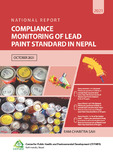Please use this identifier to cite or link to this item:
https://hdl.handle.net/20.500.14356/756Full metadata record
| DC Field | Value | Language |
|---|---|---|
| dc.contributor.author | Sah, Ram Charitra | - |
| dc.date.accessioned | 2021-11-25T05:37:53Z | - |
| dc.date.accessioned | 2022-11-08T10:19:55Z | - |
| dc.date.available | 2021-11-25T05:37:53Z | - |
| dc.date.available | 2022-11-08T10:19:55Z | - |
| dc.date.issued | 2021-10 | - |
| dc.identifier.citation | Sah, Ram Charitra, Study of Lead in Spray Paints, Nepal, Center for Public Health and Environmental Development (CEPHED). October 2021 | en_US |
| dc.identifier.uri | http://103.69.126.140:8080/handle/20.500.14356/756 | - |
| dc.description.abstract | Lead is a toxic metal that causes adverse effects on both human health and the environment. While lead exposure is also harmful to adults, lead exposure harms children at much lower levels, and the health effects are generally irreversible and can have a lifelong impact. The younger the child, the more harmful lead can be, and children with nutritional deficiencies absorb ingested lead at an increased rate. The human fetus is the most vulnerable, and a pregnant woman can transfer lead that has accumulated in her body to her developing child. Lead is also transferred through breast milk when the lead is present in a nursing mother. Evidence of reduced intelligence caused by childhood exposure to lead has led the World Health Organization (WHO) to list “lead-caused mental retardation” as a recognized disease. WHO also lists it as one of the top ten diseases whose health burden among children is due to modifiable environmental factors. Lead paint is a major source of childhood lead exposure. The term lead paint is used in this report to describe any paint to which one or more lead compounds have been added. The cut-off concentration for lead paint used in the report is 90 parts per million (ppm, dry weight of paint), the strictest legal limit enacted in the world today and also by the Government of Nepal. All lead concentrations in the report are total lead levels unless otherwise specified. The lead paint standard promulgated by the Government of Nepal, Ministry of Forest and Environment-MOFE (the then MOEST)) through a gazette notification dated 22 December 2014 with its effective dates 181 days after this notification i.e., from 20th June 2015. It has three important provisions: (a). Maximum lead-in paints imported and domestically produced in Nepal to be not more than 90 ppm; (b) Each paint cans should be labeled with lead content in the paint it contained, and (c) Each paint cans should also be labeled with a protective precautionary message for occupational safety.. | en_US |
| dc.description.sponsorship | Wolrd Health Organization. | en_US |
| dc.language.iso | en_US | en_US |
| dc.publisher | Center for Public Health and Environmental Development (CEPHED) | en_US |
| dc.relation.ispartofseries | RES01039;RES01039-SAH-2021 | - |
| dc.subject | Panit | en_US |
| dc.subject | Lead Paint | en_US |
| dc.subject | Lead Pigments | en_US |
| dc.subject | Lead anti-corrosive agents | en_US |
| dc.subject | Lead driers | en_US |
| dc.subject | Decorative paint | en_US |
| dc.subject | Solvent-based, enamel decorative paint | en_US |
| dc.subject | ppm | en_US |
| dc.subject | National Paint | en_US |
| dc.subject | Multination Paint | en_US |
| dc.subject | International Paints | en_US |
| dc.title | National report: compliance monitoring of lead paint standard in Nepal | en_US |
| dc.type | Technical Report | en_US |
| Appears in Collections: | NHRC Research Report | |
Files in This Item:
| File | Description | Size | Format | |
|---|---|---|---|---|
| RES01039-SAH-2021.pdf | Download Full Text Report. | 7.83 MB | Adobe PDF |  View/Open |
Items in DSpace are protected by copyright, with all rights reserved, unless otherwise indicated.
